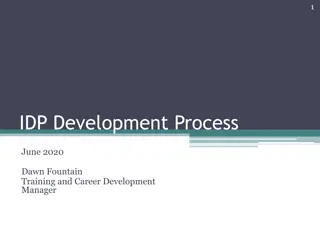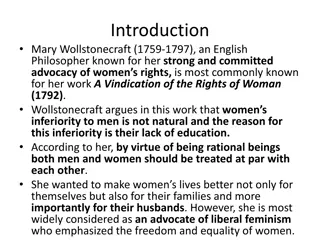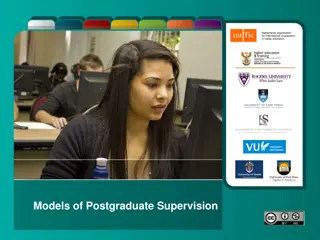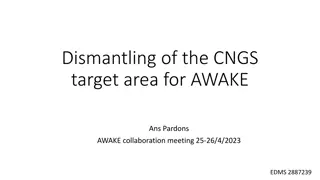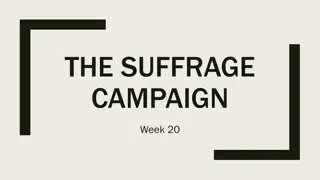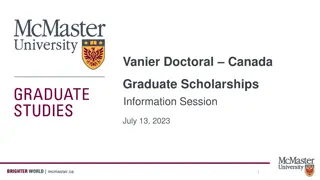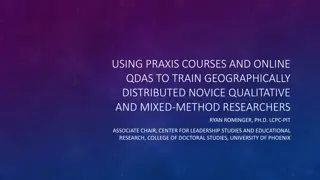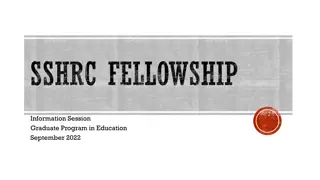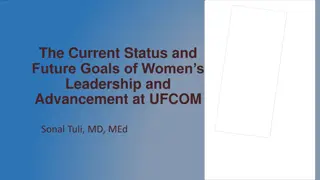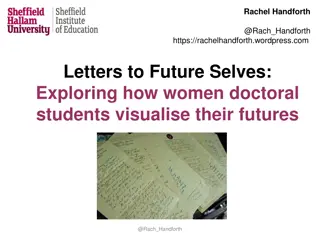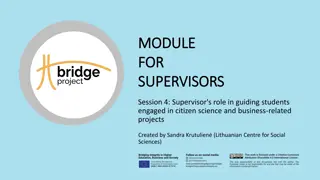Women as Doctoral Supervisors: Dismantling the Traditional System
Exploration of the emergence of women as doctoral supervisors in academia, tracing the historical context from the first known female doctoral candidate in 1787 to the gradual inclusion and impact of women in doctoral education. The evolution of the modern PhD and the changing dynamics of supervision practices are discussed, highlighting the challenges and achievements of women in academic leadership roles.
Download Presentation

Please find below an Image/Link to download the presentation.
The content on the website is provided AS IS for your information and personal use only. It may not be sold, licensed, or shared on other websites without obtaining consent from the author.If you encounter any issues during the download, it is possible that the publisher has removed the file from their server.
You are allowed to download the files provided on this website for personal or commercial use, subject to the condition that they are used lawfully. All files are the property of their respective owners.
The content on the website is provided AS IS for your information and personal use only. It may not be sold, licensed, or shared on other websites without obtaining consent from the author.
E N D
Presentation Transcript
Dismantling the Fathers House? Women as Doctoral Supervisors Barbara Grant, Critical Studies in Education, Waipapa Taumata Rau University of Auckland Seminar for CIHE Speaker Series, OISE/University of Toronto, 20 April 2023
Overview Overview 1) Briefly, some history of the modern PhD and women in relation to it Women glimmer in the archive The first known examination in the German lands of a women for a doctoral degree in arts and philosophy took place in 1787 at the University of G ttingen. Dorothea Schl zer, a professor s daughter, took the exam. The degree of doctor of philosophy had a problematic existence at this time ... Officially, no such degree existed. (Clark 2006: 102) 2) Women as doctoral supervisors in the research literature 3) Some final thoughts. Dorothea Schl zer
Emergence of the Modern PhD Emergence of the Modern PhD 1810 Statute of the University of Berlin: Spread of PhD into anglophone systems: US 1861, Yale For the first time, required the candidate to produce a masterpiece, the dissertation: Canada circa 1900 (U Toronto, 1897) Britain 1917, Oxford on the basis of this writing, his own composition, ... [the candidate] will be publicly examined to the satisfaction of his teacher (Clark 2006: 210). Australia 1948, Melbourne U awarded first 3 PhDs Aotearoa New Zealand similar post WWII timeframe. Clark (2006) is my key source here. 3
Supervision/Advising: A New Practice? Supervision/Advising: A New Practice? Professor and student transformed around 1800: Modern supervision shaped by two templates? the presiding professor, soon a doctoral advisor, ... the graduate student, then a doctoral candidate (Clark 2006: 238) In the German system, the research professor became the doktorvater, reproducing himself as embodied rational authority through supervision (Clark 2016: 17) And a new practice, some kind of relationship between doctoral advisor and candidate In the British system, the Oxbridge tutorial conducted in the privacy of the tutor s rooms provided a ready-made template: Supervision almost exclusively man-on-man: medieval doc candidates had to be male (Clark 2006: 197) mid-20th C PhD students lavished with the affection and attention reserved normally for domestic pets or favoured sons (Gardner, Beaglehole and Carter 1973: 398). the pupil has the advantage of intimate contact with a good mind and a greater wisdom than his own (Palfreyman 2008: 15).
Women Make their Place in Doctoral Education Women Make their Place in Doctoral Education In anglophone universities, women awarded PhDs from early on (except US): Women academics (supervisors): Numbers of women in full-time academic positions crept up slowly across 20th C US, first woman in 1898 (30 yrs after) Canada, first two women at UToronto in 1903 Writers still commenting on paucity of women academics who could be doc supervisors in 1990s (Conrad 1994; Heinrich 1995) Britain, in 1921, 1922 Australia, 2 of first 3 PhDs awarded by MelbU in 1948 2 were to women (French, microbiology) Now, number inching towards parity in many countries but still under-represented in senior levels, and in some disciplines. NZ, first woman in 1953 (microbiology). Mid-70s, about 15% PhD awards annually to women in US, UK, Australia (Leonard 1997) Around 2010, number of women being awarded PhDs overtook men.
Research Literature: Women Doctoral Supervisors Research Literature: Women Doctoral Supervisors Search: Work (anglophone) addressing perspectives and/or work of the woman doctoral supervisor Recurrent feminist critiques of traditional supervision: Master-disciple relation as normatively masculine (Frow 1988: 319) Small body of literature (26) starting in early 1990s, from Australia (9), Canada (3), NZ (2), South Africa (1), UK (5), US (6) As neglectful or indifferent (Johnson, Lee & Green 2000) Mixture of experience and observation -based (16) and qualitative data -based (10) Analysis of fictional accounts: figure of the supervisor ... is drawn from a recognisable type: stern, sometimes paternal, always in authority, and bearing a close resemblance to the teacher- as-untouchable-authority-and-heartless stereotype ... in film and television narratives of education (Kelly 2009: 371). My (critical) questions inspired by other feminist scholars: What are women doing to supervision? Is the woman supervisor really just a man? 6
What are Women Doing to Supervision? What are Women Doing to Supervision? Resisting, transforming meaning of supervision as a cultural practice: supervisory relationships are negotiated within a cultural context in which institutional status and power cannot be disregarded even from a feminist perspective (Jarvis & Zukas 1998: 6) Paying attention to power a successful supervision relationship ... depends crucially on mutual sympathy and trust and on a personal resonance on the part of the supervisor to the student s sense of meaning and excitement (Salmon 1992: 21) Emphasising relationality Asserting the importance of care We are too often only agitated. And we re torn between nurturing individuals and getting the work done. We experience constant conflict between taking care of people and carefully taking the profession to new and better places (Ritchie et al 2022: 56) Foregrounding the workings of desire, embodiment, emotion. [A]ny making of knowledge that goes on involves people, people who have bodies, sexed bodies, and that process is never free of desire or power, nor of class, race and gender struggles and inequalities. (Threadgold 1995: 46) EMPHASISING THE PERSONAL we realised that our bodies[supervisor s and student s] had become intertwined through the processes of writing our daily lives to each other (Somerville & Crinall 2018: 62) 7
Is a Is a Woman Supervisor Really Just a Man? Woman Supervisor Really Just a Man? The struggle for knowledge hath a pleasure in it like that of wrestling with a fine woman. (Lord Halifax, 17th century, epigraph in Dale 1997) On the other, she s recuperated into familiar patterns of power there s something deeply gendered about Western knowledge project, how disciplines work, the subjects they require: On the one hand, simply being a woman interrupts traditional masculine architecture of supervision: gendered feminine self of knowledge (sophia) All the circulating meanings and representations women bear inevitably disrupt the narrative of authority/genius/charismatic master. ... So, in the midst of these institutionalized narratives, how did we as two women (and feminists at that) jostle to make satisfactory positions for ourselves? (Bartlett & Mercer 2001: 58) gendered-masculine character of autonomous knower the Subject of Reason whose goal is mastery over knowledge structure of academic life positions supervisors as quasi-parents ... this applies especially if your supervisor is a woman, because you can find yourself expecting her to be all-giving and all powerful (Leonard 2001: 87, italics added). These gendered configurations have shaped various often fraught and unsatisfactory (Johnson, Lee & Green 2000: 136) supervision pedagogies that, of course, women supervisors themselves often experienced/were shaped by. And we see, in the literature, that women are making deliberate attempts to supervise otherwise . Feminists tread on men s turf ... [when entering the university] but we do it with a lot of self-recrimination and self-blame. We get exhausted by the process. We carry weights on our feet . (Leonard 2001: 233)
A Conflicted Space of Risks, Dangers ... A Conflicted Space of Risks, Dangers ... Feminist staff in particular feel stressed by their concern to support [women] students while faced with the open- endedness of student demands in an entitlement culture . Conversely they find themselves too much locked into doing pastoral work and teaching to complete their own PhDs or to get promotion (Leonard 2001: 89). [P]erhaps the greatest risk for feminist supervisors is a denial of the significance of knowledge/power in research relationships, and an over-emphasis on reciprocity and mutuality (Jarvis & Zukas 1998: 6) [I]n attempting to move away from the position of master ... [women supervisors] have felt overwhelmed in their relationships with students (Johnson, Lee & Green 2000: 144) What if your mother refuses her gaze, turns her attention elsewhere?... If she wields power not as care, nurturance, preservative love, but as assertion, need, desire of her own? Or if she is off playing, with other women or men? Or in her own head? Can daughters stand to be cut off, outside the dyadic circuit? (Threadgold 1995, citing Flax: 46) [T]he supervisor is, by the very nature of her role, inevitably too close, too invested, and definitely cares too much. I want my dissertator to succeed because she is my student , because her success reflects on me. (Gallop 2001: 155) 9
Final Thoughts Final Thoughts Feminist voices contribute uniquely and significantly to the empirical, epistemological, and normative conversations constituting academic discourse (Peterson 199: 244) Women are reflexively resisting the traditional architecture of supervision all the research exemplifies this Women are (perhaps slowly) transforming the norms of supervision an empirical question, sometimes addressed But, considerable tensions for practising supervision in a more personal way in a globalised, massified, system, where: institutional expectations of supervision (and staff:student ratios) are intensifying new managerialism/corporatisation is the dominant institutional logic, arguably a gendered project gender relations are pluralistic and contested (complexly intersected with other axes of identity and/or place) Do we need to rethink the feminist personalising of supervision? for example, Chuh (2013) argues for a return to the impersonality of the advisor (some version of that...). and, if so, towards what? Bronwyn Davies suggests of women s efforts to change the academy that any process of [d]ecomposition is tough, slow, never- ending work, in which one is caught over and over again undoing the thing one thought one had accomplished (2006: 500).
References References Irigaray, L. (1985). Is the subject of science sexed? Cultural Critique, Autumn(1), 73 88. Bartlett, A., & Mercer, G. (2001). Mostly metaphors: Theorizing from a practice of supervision. In A. Bartlett & G. Mercer (Eds.), Postgraduate research supervision: Transforming (r)elations. New York: Peter Lang. Jarvis, C., & Zukas, M. (1998). Feminist teaching, feminist research, feminist supervision: Feminist praxis in adult education. Paper presented at the Adult Education Research Conference, San Antonio, Texas. Beasley, C., & Jaworski, K. (2015). Passionate activism as academic labor: The emotional body of pedagogical politics. In L. Bryant & K. Jaworski (Eds.), Women supervising and writing doctoral theses: Walking on the grass (pp. 35-51). Lanham Boulder, New York, London: Lexington Books. Johnson, L., Lee, A., & Green, B. (2000). The PhD and the autonomous self: Gender, rationality and postgraduate pedagogy. Studies in Higher Education, 25(2), 135-147. Centra, J. A. (1974). Women, men and the doctorate. Princeton, NJ: Educational Testing Service. Leonard, D. (2001). A woman's guide to doctoral studies. Buckingham: Open University Press. Clark, W. (2006). Academic charisma and the origins of the research university. Chicago: University of Chicago Press. Leonard, D. (1997). Gender issues in doctoral studies. In N. Graves, V. P. Varma, & V. Varma (Eds.), Working for a doctorate: A guide for the humanities and social sciences (pp. 152-183). London: Routledge. Conrad, L. (1994). Gender and postgraduate supervision. In O. Zuber-Skerritt & Y. Ryan (Eds.), Quality in Postgraduate Education (pp. 51-58). London: Kogan Page Nerad, M. (1999). The academic kitchen. Albany NY: State University of New York Press Dale, A. (1997). Wrestling with a fine woman: The history of postgraduate education in Australia 1851 1993. (PhD), The University of Adelaide, South Australia. Peterson, V. S. (1993). Disciplining practiced/practices: Gendered states and politics. In E. Messer- Davidow, D. R. Shumway, & D. J. Sylvan (Eds.), Knowledges: Historical and critical studies in disciplinarity (pp. 243-267). Charlottesville: University Press of Virginia. Davies, B. (2006), Women and transgression in the halls of academe , Studies in Higher Education 31, no. 4: 497 509. Salmon, P. (1992). Achieving a PhD: Ten students' experience. Stoke-on-Trent: Trentham Books Limited. Dobson, I. (2012). PhDs in Australia, from the beginning. Australian Universities Review, 54(1), 94- 101. Simpson, R. (1983). How the PhD came to Britain. Guildford UK: The Society for Research into HIgher Education. Gallop, J. (2001). Resisting reasonableness. In A. Bartlett & G. Mercer (Eds.), Postgraduate Research Supervision: Transforming (R)elations (pp. 147-160). New York: Peter Lang. Somerville, M., & Crinall, S. (2018). Intergenerational bodies: Women s knowledge production in supervisory relations. In A. L. Black & S. Garvis (Eds.), Women activating agency in academia: Metaphors, manifestos and memoir (pp. 54-66): Routledge. Gardner, W. J., Beaglehole, E. T., & Carter, T. E. (1973). A history of the University of Canterbury 1873-1973. Christchurch NZ: University of Canterbury. Stengers, I., Despret, V., & Collective. (2014). Women who make a fuss: The unfaithful daughters of Virginia Woolf. Minneapolis: Univocal. Grant, B. M. (2003). Mapping the pleasures and risks of supervision. Discourse: Studies in the Cultural Politics of Education, 24(2), 173 188. Threadgold, T. (1995). Pedagogy, psychoanalysis, feminism: Review of Jane Gallop Seminar Papers. The Australian Universities' Review, 38(2), 46-48. Heinrich, K. T. (1995). Doctoral advisement relationships between women: On friendship and betrayal. Journal of Higher Education, 66(4), 447-469.




